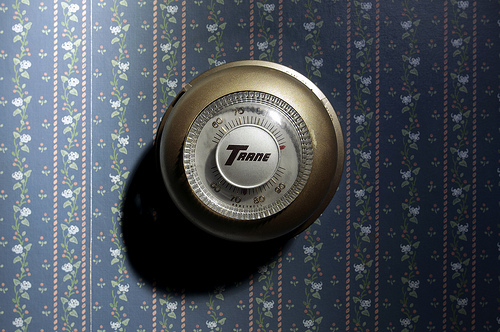The electric storage heater is married to Economy 7 (E7). As with any marriage, things can go wrong. Here, then, are tips on what to look for if your heating bill goes up, and you suspect that the storage heater might be the cause.
An E7 Overview
The ubiquitous night storage heater is literally wired to take advantage of cheap electric rates at night. While everyone is sawing logs in bed, this heater is drinking in energy to keep people warm at home when they awake. It’s cheaper to supply this heater with energy at night because power plants can’t shut down. It costs power companies more money to stop and start power generation than to let the plant run 24 hours a day. Because consumption of energy is low at night, the energy price is also low. It’s simple economic supply and demand at work. This is why the E7 tariff exists in conjunction with the electric storage heater.
Problems and How to Solve Them
Just like in any marriage, small problems pop up. Storage heaters are no different. When heater problems arise, most people think that the heater is broken. However, that is not always the case. Simple understanding of these units and their controls can return bliss to a household.
Heater Controls
The most common complaint centers on excessive energy use and subsequent high heating bills. This problem may be solved by understanding the heater controls. The primary controls with this heater are the output and input controls.
The input manages the amount of heat that is stored overnight. This control is usually responsible for high heating bills. The solution, then, is to slightly turn down the input control, and your consumption of energy will go down. This slight reduction in input will not noticeably affect your comfort, but the odds of your energy bill going down are very likely.
If you head out for the day, be certain to turn down the output control. This will retain the heat you paid for that night. When you return home, the output can be turned up to warm your room.
If your heater is mated with a convection heater, resist using it too much as you will be charged at the more expensive peak-hour rate.
Faulty Wiring
It’s fairly common to see these heaters wired wrongly which causes more energy usage and higher bills. If that’s the case, the heater may have been wired for the 24 hour electric supply which includes drawing energy during the more expensive peak-hours rate. The heater needs to be wired properly to take advantage of the cheaper E7 off-peak hours.
If you notice that the heat is constant all the time, then it’s likely that the heater is wired wrong. The heater could be overheating, too, and not cutting off when it’s meant to. Ring up your energy supplier to drop in to check the wiring.
Maintaining Temperatures
Storage heaters have a tough go at maintaining temperatures when it’s below freezing outside. That’s the way of these heaters. However, if the heater has been doing its job and seems to be falling off a tad, then an element or thermostat may need to be replaced.
New Heater Problems
If the heater is new and the room isn’t warm enough, the problem may be that the room wasn’t sized correctly for that particular heater. In that case, you need a bigger heater to maintain a comfortable temperature.
Lukewarm Temperature
Check to see if the cat or the kids moved the input control setting. If it appears okay, then it may be a thermostat or an element failure.
Automatic Storage Heater
These heaters have sensors that take a reading of the room temperature, overriding the input charge for that night. This will determine the amount of heat released for the next day. These heaters come with their own ideas of how things should be in the room. The heater’s opinion of the proper temperature may not exactly match up with that of the user, creating frustration. Manual heaters are easier to control.
By understanding the heater controls and how these heaters should operate, you can set the heater correctly and be certain that you’re taking full advantage of your Economic 7 tariffs.
About the author: Laura Ginn knows that unless you understand the way that Economy 7 heating works you will not be able to take advantage of the great savings on your energy bills. If you want to know more about Economy 7, uSwitch compares gas and electric prices and rates so you can see the difference in running costs for yourself.
